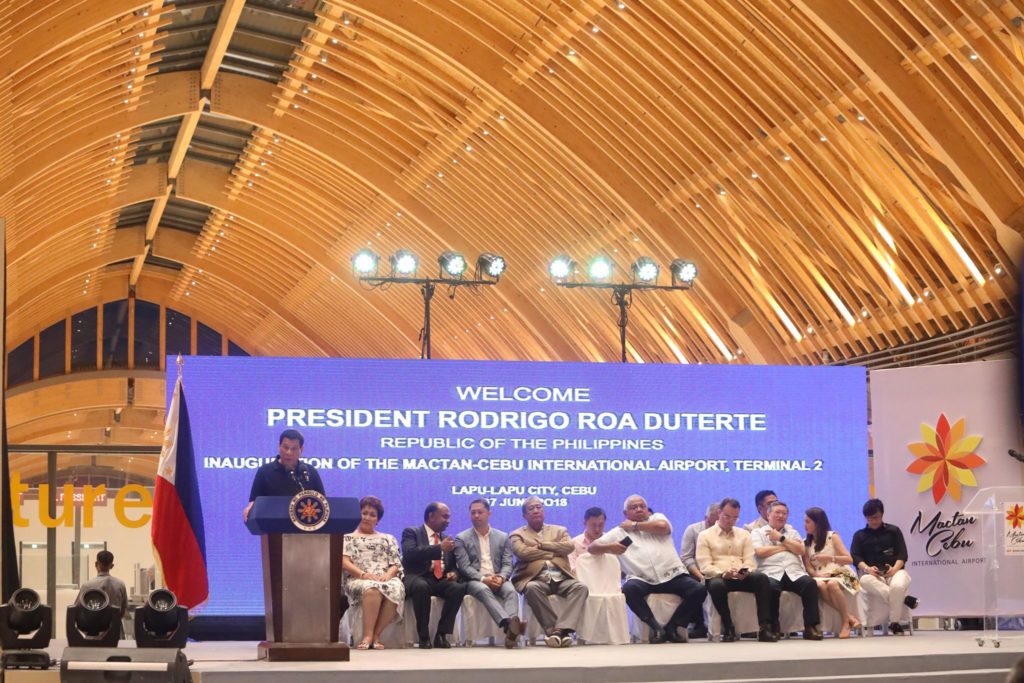Duterte leads inauguration of world’s 1st resort airport
The world’s first and “friendliest” resort airport has finally opened its doors.
But it will come with a higher price.
Once the Terminal 2 of Mactan Cebu International Airport (MCIA) in Lapu-Lapu City opens for commercial operations on July 1, passengers of international flights from Cebu will be paying a higher terminal fee of P850, a P100 increasecompared to the current rate of P750.
“We will expect a P100 increase for the terminal fee of international flights while for domestic flights, it will remain at P200,” said lawyer Steve Dicdican, general manager of the Mactan Cebu International Airport Authority (MCIAA).
He added all international flights will be transferred to the Terminal 2 starting July 1 while domestic flights remain at the old terminal.
President Rodrigo Duterte led the inauguration of the P17.5-billion facility on Thursday afternoon.
The three-story building has a floor area of 65,500 square meters.
The first floor will be the international arrivals area, where arriving passengers will get their baggage.
The second floor serves as the actual boarding areas, while the third floor is the departures area and check-in area.
In his speech, President Duterte said he was “proud” to join the Cebuanos in inaugurating the facility.
“I was awed when I started to walk toward this way. Napakaganda ng airport niyo. Inggit din ako kasi matagal akong mayor sa Davao (Your airport is very beautiful. I am jealous because I was mayor of Davao for a long time), 23 years. Davaoeños would have also wanted an airport as beautiful as yours,” he said in his speech.
The President arrived around 5 p.m. at the international arrivals area of the Terminal 2, located on the ground floor.
He led the unveiling of the marker of the new passenger terminal.
He was welcomed, among others, by Transportation Secretary Arthur Tugade, GMR-Megawide Cebu Airport Corporation
President Louie Ferrer, GMCAC Board Chair Srinivas Bommidala, and Tourism Secretary Bernadette Romulo-Puyat.
The group, together with other officials, went through the baggage carousel area and up to the departures area.
The President also walked through the shops at the Duty Free Philippines store.
Stakeholders are also upbeat about the formal start of commercial operations of the facility on July 1.
The Terminal 2 is one of the flagship projects under the Duterte administration’s Build, Build, Build, infrastructure program although it was started by the previous Aquino administration.
It is expected to increase the MCIA’s current passenger capacity to a minimum of 12.5 million passengers a year.
“For the past years, MCIA’s demand has exceeded the physical capacity of its terminal. With the addition of Terminal 2, not only will we be able to sustainably cope with the steadily increasing number of passengers, we will also be able to open Cebu to more international flights,” said GMCAC’s Ferrer.
The GMCAC is a consortium of Filipino engineering and infrastructure company Megawide and leading Indian infrastructure company GMR.
They took over the operations of the MCIA in November 2014, under a 25-year Build-Operate-Transfer agreement.
Construction of the Terminal 2 broke ground in June 2015.
The facility is designed by Hong Kong-based Integrated Design Associates (IDA) together with local designers Budji Layug, Royal Pinda, and Cebu’s very own and internationally renowned designer, Kenneth Cobonpue.
Ferrer said the terminal’s captivating design is a symbol of the culture of Cebu and the Philippines. Its roof, which is made of glue-laminated (glulam) timber, forms arches that are reminiscent of the waves of Cebu’s beaches.
Using wood, which is first for any airport in Asia, also reflects Cebu’s stature as furniture capital of the Philippines, he said.
Its floor tiles are made of polished concrete but shards of mother of pearl are inserted into the tiles to reflect the sunlight, creating a glitter similar to that of the sand under the glowing sun.
Srinivas Bommidala, GMCAC’s board chairman, said that being the country’s second biggest airport and gateway to the Visayas, the MCIA is major driver of the region’s economic growth.
“We are optimistic about the Philippines’ growth story, specifically in aviation, and look forward to contributing further to its ongoing Build, Build, Build, program,” he said.
The GMR-Megawide consortium also won the contract for the expansion of the Clark International Airport.
The Terminal 2 will have 48 check-in counters that are expandable to 72.
Each counter is designed with rattan and is back-lighted to make it look like lanterns.
It has provisions for seven-passenger boarding bridges which can be expanded to 12.
The entire terminal is also equipped with 12 escalators and 15 elevators.
A car parking facility will be available that can accommodate 550 cars and is expandable to 750 cars as needed.
“It is exciting to see that you have come this far in letting our kababayans (countrymen) and tourists see real and lasting change.
As one of the finest airports in Asia, this facility will showcase the best of what the Philippines has,” President Duterte said in his speech which lasted for about 40 minutes.
In the weeks leading to July 1, the MCIAA and GMCAC will continue with minor finishing works in the terminal building.
But in the last week of June, the Terminal 2 will be opened for public viewing.
The MCIA is currently catering to 25 international flight destinations, 30 domestic flight destinations, and is partnered with 26 airlines.
For her part, Secretary Puyat said Cebu plays a “strategic” role in their National Tourism Development Plan 2016-2022, being a top destination and international gateway.
“Our national targets of 12 million inbound visitors and 89.2 million domestic travelers in 2022 are now within closer reach as we move to upgrade gateways, develop more destinations, and uphold international tourism standards,” she said in her speech.
